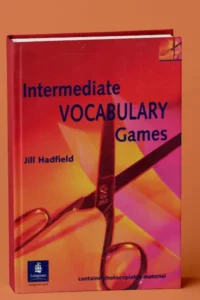GET Vocabulary Games is a wide variety of games including puzzles, role-play, board games, and guessing each game involves vocabulary memorization, personalization, then communication. Teacher’s notes help you manage each game.
About this book
The games in this book have been designed to practise grammar, not to introduce or explain it. This book assumes that the class has already met each grammar point, and that it has been explained in the textbook or course that they are following.
The games are to be used as practice exercises to help students get used to and remember grammatical rules and patterns. They are designed as fun activities to help lighten the load of grammar learning. It is up to you, the teacher, to decide when and how to use them, but one suggestion is as light relief at the end of a lesson which has focused on grammar, or after a session doing more traditional, perhaps written grammar exercises.
About games
A game is an activity with rules, a goal, and an element of fun. There are two kinds of games: competitive games, in which players or teams race to be the first to reach the goal, and cooperative games, in which players or teams work together towards a common goal.
Language games can be divided into two further categories: linguistic games and communicative games. In linguistic games, the goal of the game is linguistic accuracy: in the case o f these grammar games, using the correct grammatical forms.
Communicative games have a goal or aim that is not linguistic:
- successful completion of the game involves carrying out a task such as exchanging information,
- filling in a picture or chart, or finding two matching cards,
- rather than the correct production of language.
However, in order to carry out this task it will be necessary to use language and, by careful construction of the task, it is possible to specify in advance what language will be required.
Games can be used at any stage of the lesson once the target language has been introduced and explained. They serve both as a memory aid and repetition drill, and as a chance to use language freely, and as a means to an end rather than an end in itself. They can also serve as a diagnostic tool for the teacher, who can note areas of difficulty and take appropriate remedial action.


